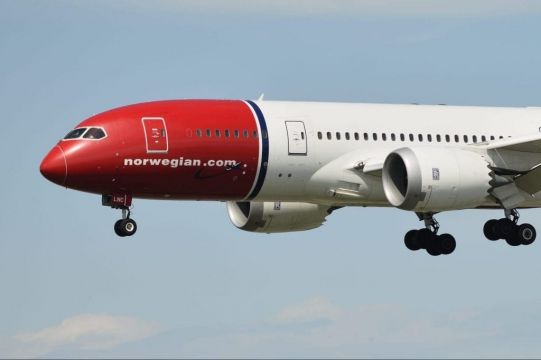Norwegian Air's cash crisis could force the debt-laden budget airline to halt operations early next year, the company warned as it issued another plea for rescue funding after reporting quarterly results on Tuesday
The rapid expansion of the pioneer in low-fare transatlantic flights has left it with heavy debts and its problems have been compounded by the Covid-19 pandemic. It is now serving domestic routes only, with six of its 140 aircraft flying.
"Norwegian is dependent on additional working capital in order to continue operating through the first quarter of 2021 and beyond," the carrier said.
The company held cash and cash equivalents of 3.4 billion crowns (€318 million) at the end of September, down from 4.98 billion crowns three months earlier.
Its latest plea comes after Norway's government on Monday rejected calls for more state support for the airline, the shares of which have lost 99 per cent of their value since January, saying it would be too risky.
Following that rejection, the company said late on Monday that it would furlough 1,600 more staff, leaving only 600 people still working out its 10,000 before the pandemic.
In a further sign that Norwegian is running out of time, the board representative of its biggest shareholder - leasing company AerCap Holdings - resigned on Tuesday.
Anton Joiner was Norwegian Air's deputy chairman of the board and had been elected in June. The airline did not disclose the reason for his resignation and an AerCap spokeswoman had no immediate comment.
AerCap owned 13.4 per cent stake of the airline at the end of September.
'Likely collapse'
After Oslo's aid refusal, the grim quarterly numbers point to a likely collapse, said Bernstein analyst Daniel Roeska. "It's not a pretty picture."
Mr Roeska also said that credit from the airline's suppliers is likely to dry up rapidly.
"This could cause a liquidity crunch in the very near term and we see few ways out for the group," he added.
Despite such pessimistic assessments, the company said that funding could potentially come from debt refinancing, a sale of aircraft and other assets, a conversion of debt to equity or from its owners.
However, aircraft leasing companies that own more than half of the airline after swapping earlier debts for equity are unlikely to put in any new cash, a source close to one of the firms said.
"Norwegian was a credit red light for lessors even before Covid," said the source, adding that they joined the rescue initially because liquidation would have saved only a few cents on each dollar owed and it would have had to sell aircraft in a market that was strained even before the coronavirus crisis.
"Norwegian was getting a friendly ear because it would have meant a glut of 787s," the source said. "But that's become nearly irrelevant. 787s, 737s, A320s - they're all on the ground now."

The company's third-quarter operating loss stood at 2.8 billion crowns, down from a 3 billion crown profit in the same period last year, with overall debt and liabilities of 66.8 billion crowns.
With only six of its 140 aircraft now operating, down from 21 last month, most of its short-haul planes are grounded alongside its entire fleet of 37 Boeing 787 Dreamliners.







